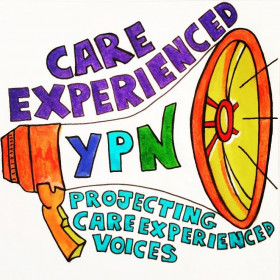Finding housing as a young person is pretty terrifying, there’s no denying it – especially when moving out for the first time. Whether it’s in student accommodation, private renting or other forms of independent living, the fear of the unknown can feel quite overwhelming. Whether you enjoy your current living circumstances, the town/city you live in, the people you live with (or living alone) or not, you’re inevitably having a lot of questions about what life outside of your current circumstance is going to be like. It's so easy to get overwhelmed by the idea of experiencing a new day-to-day life, but there’s always at least some excitement in that opportunity too.
I, for one, was pretty scared and excited by the idea of moving 160 miles from my foster parents home to live in student accommodation for my undergraduate degree. I moved from the Midlands to Greater London, so the distance, combined with the drastic increase in living costs, alongside being very nervous about my studies all felt like a lot to handle at the time. I’ve moved house four times since the age of 18 (I’m now 23) and the first move was definitely the most difficult. That being said, I definitely gained more knowledge and independence from this experience than any other, largely out of the need for doing so. I’m hoping a few of the things I’ve learned along the way can be of value to you if you’re moving out, whether you’ve come from a background of the care system or not, but there are some extra tips for our care experienced readers if you need them!
Housing
Addressing your wants, not just your needs.
Something that took me a while to realize is how important it is to consider housing options that include things that you want, not just things that you need. Having a disregard for the ‘wants’ could be due to past experience of coping in insufficient living conditions, experiencing a large number of moves, or generally having a poor relationship with the concept of ‘home’. No matter the reason, recognising your entitlement to enjoying the place you live is essential to actually being able to achieve that. Equally, you definitely don’t have to be care experienced to find difficulty in calling a house a home, or having trouble making positive associations with the place you live. There’s no denying that more desirable living circumstances are generally found by those who can afford them, and I completely recognise how this affects people of low income backgrounds especially. There is absolutely a correlation between financial status and quality of life in terms of housing, but here I want to talk about the small things that make the difference.
Taking the time to establish the things that will encourage happiness in your new circumstances can be as simple as exploring the things that are important to you here and now. Sometimes, sadly, finding out the things you want in a living space comes from experiencing the total opposite, and learning to remedy those obstacles creatively, or deciding to make a future investment in avoiding them.
For example, I know that having separate spaces to work, eat and sleep is something I really benefit from in keeping a good work-life balance and sustaining a good mental health. It sounds simple, but a lot of student accomodation options don’t really have this option, especially in student halls. Knowing that I would have very limited space in my first year accommodation at uni due to the high living costs in the area, I was very conscious of ensuring there were lots of nearby walking trails, study areas and social spaces to separate the different aspects of my life. I knew that having close access to nature was important for me to feel at home, as that’s something I’d always been around growing up, and that’s a quality I could find in other spaces. Though I had actively looked for ways around this obstacle of space, I still found that living in a 3 x 1.5 meter room during first year was pretty difficult in terms of feeling isolated, but this is something I definitely learned from as a result.
All of my moves since this experience have been far more positive, having listened to my ‘wants’ in terms of space, and making the necessary changes to establish a healthier relationship with my living space. Filtering this idea down to the details that ensure a comfortable daily routine is no simple task, and it’s something all of us are constantly working towards at any age, so know that any progress you make is really valuable, and those ’wants’ will change as you do!
Guarantorship: unsolved.
A pretty giant obstacle for many young people looking to rent privately in the UK, is the need for a guarantor. A guarantor is ultimately someone who legally binds themself to the responsibility of paying rent if you can't, for example a parent, guardian or close relative. Currently this stands as a necessity in the UK upon entry to private renting, and considering the amount of young people who have unconventional families and complicated personal relationships, this is a hugely discriminatory policy. Additional criteria for a guarantor often includes that they have a good credit score, a current working contract for at least 6 months, and sometimes even a mortgage. The fact of the matter is that many young people don’t have the privilege of having a close relative who is able to act as a guarantor for them under this criteria.
My difficulty with guarantorship stems from the fact that at present, local authorities are unable to act as guarantors to the care experienced young people that they are responsible for. Many care leavers may not have a particular guardian that they can turn to in this situation, many may have poor relationships with their guardians that prevent guarantorship, and many may have guardians that don’t qualify under the listed criteria. Though I am lucky enough to have a great relationship with my foster parents, they were unable to act as guarantors in my private renting due to being retired. This specific scenario could have easily happened to a non-care experienced person too, so it’s clearly a flawed process in general, but the fact that my legal parent (my local authority) couldn’t support me here is a further statement.
I had attempted to use paid online guarantorship methods, however private landlords can choose to accept or decline these at their own discretion (so in general it is worth a try, and you can get refunded for these services if they don’t work) and the landlords whose properties I had been enquiring about specifically chose to decline this method.
My only way around private renting post-uni was down to incredibly fortunate circumstances. I decided to rent a property with my best friend, and she was kind and financially comfortable enough to act as a sole tenant to the property. I am therefore listed on my renting contract as a ‘permitted occupier’, meaning that in practicality I still have all the responsibilities of a tenant, but legally nothing is bound to me. When I think about that term literally, ‘permitted occupier’ doesn’t sound particularly warm or inviting, and it’s not a particularly positive terminology that I have to be listed as, and it’s definitely an injustice that my ability to rent relies on the huge commitment that my friend made. I wish I knew of a ‘one size fits all’ solution to this problem, but hopefully there’ll be some headway in all local authorities being able to act as guarantors, or providing other nationally accepted methods of guarantorship to those in need of it.
The Practicalities of Independence
Schools really don’t teach enough about living as an adult – bills, council tax, and budgeting in general were never touched on during my time at highschool, and it wouldn’t surprise me to learn that’s still the case now. It’s another layer of moving house that feels super scary and unfamiliar to all of us, and so many of us have to learn about this as we’re experiencing it for the first time.
The general stigma about discussion of money and finances probably has a lot to do with this, especially as so many of us don’t have this conversation with our guardians and loved ones. If at all possible, utilising the knowledge of people around you is a great way to learn the ropes. Even if your loved ones or mentors are shy about the topic of money, having some advice that correlates with their experiences is never too much to ask of someone, and really useful if they live nearby to where you’re moving. As scary as it is, don’t be afraid to do your own research too. The internet is responsible for a lot more of my knowledge about living as an adult than I’d like to admit, but it exists for the reason of sharing knowledge, so see what’s out there, and ask for help when you need it. If you have access to mentors through your place of study or your local council, that’s a great service that exists to help you, so don’t be afraid to use it!
Something I have found difficult to establish as a care leaver, is how my entitlements change due to policy alterations over the years, or due to my age, in regards to support with living independently. If you’re care experienced, the support you receive feels like it’s constantly changing, so planning a future can feel pretty challenging to say the least. Every local authority provides different levels of support to care leavers, so it’s hard to also learn what you’re entitled to unless you know another care experienced person your age, under the same local authority as you.
At the age of 21, the access to a leaving care worker is drastically reduced, therefore the older the care leaver, the less 1-on-1 advice they are entitled to through the care system which, for many, is an essential source of support. All things considered, leaving care workers do work tirelessly to help so many of us build the future we deserve, but they’re overstretched. Regardless of that, if you’re a care leaver, ask for as much support as you need, as soon as you need it, because you deserve to claim everything you’re entitled to (and more, if you ask me).
Part 2 of this series will be released on 22 April, and will be available via this link.
Lucy is a freelance composer, facilitator and musician, specialising in the representation and co-creation of careexperienced young people within her work. As part of the young people's network she is also passionate about research and youth voice. You can find her on Twitter here.








0 Comments